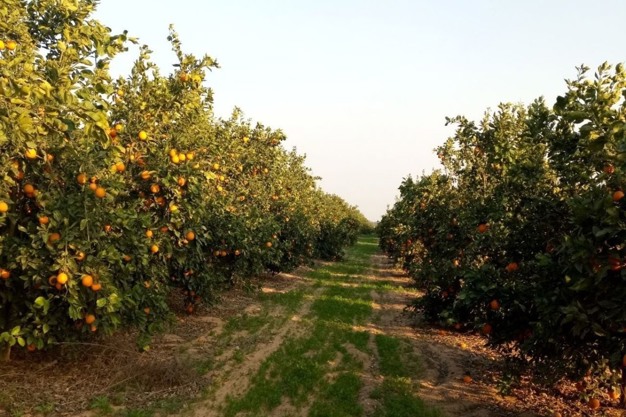The 2023-2024 Egyptian citrus season has got off to a good start, amid a positive mood and high spirits. Production is marked by a better distribution of sizes, whereas the previous season was marked by sizes that were too small. Volumes have increased, and the climatic factor is causing serious difficulties for the competition while having a positive effect in Egypt. Everything pointed to a fine season. Yet the situation changed rapidly, in the space of a few days, complicating the campaign beyond repair. War broke out in the Middle East, triggering the Red Sea crisis that dragged on throughout 2024. For the citrus industry in particular, the impact of the crisis turned the campaign "simply unprofitable," according to the Egyptian exporter Amgad Nessem.

Surprise guest at the start of the campaign
Amgad Nessem is the Export Manager at El Teriak Farms, a company that produces and exports citrus and other fruits. He tells how he has experienced the season: "The outlook for the season was very promising, as we finally got rid of the problem of small sizes, which penalized us severely last season. But the atmosphere changed very quickly at the end of 2023 when the war spread in the region like a fire. What happened next is well known. In December, Maersk announced the suspension of its Red Sea routes, followed by 13 other shipping companies. We were disarmed, waiting for a rapid resumption of shipping. But by January 2024, the industry was in panic and chaos. The closer we got to June, signaling the arrival of fruit flies and the end of exports, the more we resigned ourselves to accepting the fate of the campaign. Towards the end of the season, Egyptian oranges were exported at the same price as the local market."
Egypt cut off from half of its global market, oversupply in Europe
The Red Sea separates Egypt from more than half of its citrus markets, including Saudi Arabia (and by extension the Gulf markets), the third largest market for Egyptian oranges after Russia and the Netherlands, and other markets in Asia such as India, Bangladesh, China, Malaysia, Hong Kong and others. Nessem says: "In terms of volume, these markets together account for more than half of Egyptian exports, i.e. more than 800,000 tonnes for oranges alone if we take last season's figures, bearing in mind that this season's volumes have increased by at least 25%. The impact on exporters specializing in these markets is obvious, but the impact on the industry as a whole has spread rapidly."

The exporter continued: ''It means that all exporters had to fall back on limited markets like Europe, which can't absorb such volumes. At El Teriak Farms, we export exclusively to Europe, but we were caught up in this crisis as early as February when the drop in demand impacted our programs. We're lucky enough to work with serious, respectable customers, and export exclusively under contract, yet we have seen our prices fall and payment terms become more difficult.''
The shipping lines linking Egypt to Asia, via the Red Sea, have become unsafe for most shiplines and were quickly suspended from December onwards, and the alternative lines make the long detour of the continent via the Cape of Good Hope. Nessem: "In terms of transit times, this represents a two-fold increase, from an average of 28 days to more than 60 days. Transport costs have also doubled. It has to be said that shipping companies have taken full advantage of the situation. As we all know, not all shipping companies are targeted by the attacks in the Red Sea. New Asian companies replaced the traditional ones as soon as March, but they remained rare and raised their prices exaggeratedly."
Exports to Saudi Arabia and the Gulf countries across the Red Sea were maintained by ferry, but their price also increased following the explosion in demand, rising from USD 2,000 to USD 6,000 according to Nessem. Although the Gulf market is attractive by absorbing large volumes, it imposes a harsh trade and payment regime on Egyptian exporters, and the Red Sea crisis has only exacerbated these conditions: exports under commission, which Europe imitated this season after the crisis broke.

Slow demand, falling prices and longer payment delays
Nessem explains: "For reasons that escape me, or let's say for cultural reasons, Saudi importers impose a commission-based sales system on Egypt. It's very disadvantageous because it's opaque and there's no way of controlling the volumes sold. This system is only imposed on Egyptian exporters, unlike Poland which exports its apples to Saudi Arabia or South Africa which exports its citrus fruit under contract. We have always called on our Egyptian colleagues to begin the transition out of this grey area and to reject this method of payment, which penalizes the entire Egyptian industry and economy."
"This season, due to the Red Sea crisis, European importers, faced with an abundant supply, very quickly realized that they could impose this method of trade on Egyptian exporters, as early as February," adds the exporter. "In the Netherlands, for example, I estimate that this method of payment has increased by at least 40% this season in the citrus industry. As far as we at El Teriak are concerned, as I said, we are fortunate to work with respectable customers, but we have suffered indirectly from the effects of oversupply. Our normal payment terms went from 80%-20% to 50%-50%. Prices have fallen by 25% on average."
The crisis was mitigated by circumstantial factors
Of good fortune, the Red Sea crisis coincided with other mitigating circumstances. Firstly, climate change hit Egypt's competitors hard, particularly in Spain. Nessem says: ''Right from the start of the year, we reacted to the crisis by looking for new markets, and we were helped by the lack of supply of Navel and Valencia oranges from Spain and other competing origins. We found circumstantial demand in several parts of the world, including Canada, Argentina, and Brazil. In Europe too, we found outlets in Georgia, Latvia, and Lithuania. We received some orders from African countries as well. Let's just say that we were only able to save the season, without making a profit, but it would have been much worse if the usual Spanish production had been there."

The crisis has also coincided with a currency reform in Egypt. The government has implemented the liberalization of the exchange rate of the Egyptian pound against the dollar, which has led to the devaluation of the local currency. Nessem comments: "This increases our costs considerably, but it also works the other way round. Overall, it takes time to adjust to the effects of the reform, but it also brings a great deal of stability to the economy and means that we don't have to rely on the black market for the dollar supply as we did before. March was a difficult month, but we started to feel the effects of this stability from April onwards."
"The Red Sea crisis will not be resolved either politically or peacefully"
Many Egyptian exporters were hoping for a swift resolution to the Red Sea crisis, but it turns out that the crisis is here to stay. Nessem has no illusions: "Unfortunately, the Red Sea crisis will not be resolved either politically or peacefully. We have seen how the major world powers tried to put an end to the suspension of shipping lines, before calmly withdrawing. The Red Sea crisis is just one facet of the war looming over the Middle East, and the inevitable will eventually happen. In the worst-case scenario, this means a halt to business. In the meantime, we're adapting and building on the strengths of the Egyptian citrus industry, in particular the climate factor, which is working in our favor."
What to expect next season? "If we're optimistic, the Red Sea crisis will still be with us, which means the situation hasn't worsened," replies Nessem soberly. "As far as citrus is concerned, we will necessarily need a decrease in Egyptian volumes, as well as a lot of work to develop new markets. There is still potential in markets that are not yet fully developed, such as the Americas, Africa, and European countries like Poland."
Note: This article was originally published on October 3, 2024 on Primeur magazine in English and Spanish at the occasion of Fruit Attraction 2024. Since this article was first published, official statistics from Egypt have shown a decrease in exports to Asian countries, an increase in global exports by volume, and a decrease in global exports by value per tonne.
For more information
Amgad Nessem
El Teriak Farms
Tel: +201 207 976 920
amgad.nessem@elteriakfarms.com
www.elteriakfarms.com
